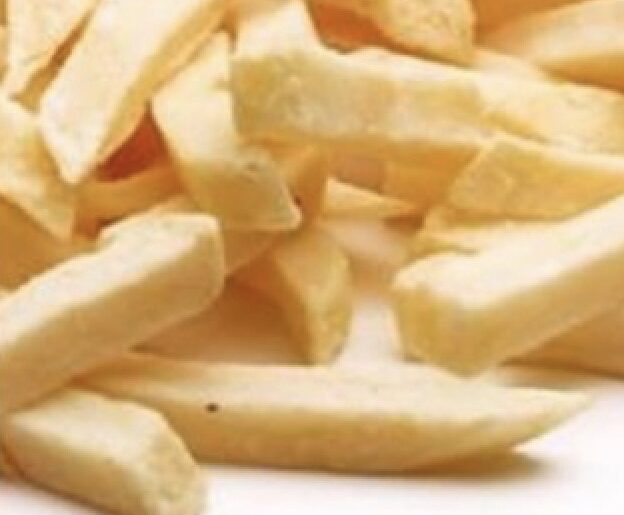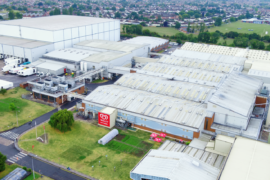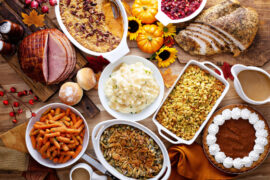With war in Ukraine unleashed by Russian invaders now in its second month of carnage and devastation, the lives of combatants and civilians in harm’s way that have been turned upside down. So too has the food industry, as shortages of staples and ingredients are being felt near and far, and the dwindling supply sunflower oil is increasingly impacting french fry processors and other food manufacturers in Europe and beyond.
“As things stand, I think we have a couple of weeks left with our supply of sunflower oil, but no more,” Christophe Vermeulen, chief executive of Belgapom, was quoted in a PoliticoPro report published on March 27. The trade association represents potato companies throughout Belgium, many of which produce frozen fries pre-cooked in sunflower oil. Among them are Agristo. Aviko, Clarebout, Ecofrost, Farm Frites, Farmco, Lutosa, Mydibel and Pomuni.

Ukraine typically supplies the Belgian value-added potato sector, which transformed approximately 2.08 million tons of tubers into frozen fries last year, with up to 45% of its sunflower oil requirements.
Ukraine is the world’s leading source of sunflower oil, producing 6,450,000 metric tons or 30.6% of global output in 2021, according to USDA WASDE and PSD Database figures. Exports amounted to 5,750,000 metric tons valued at $6.4 billion, or 47% of global volume.
Production is primarily in the eastern and southeastern regions of the country, where sunflower sowing takes place in April and May, with harvesting generally beginning in September.
Substitution of Ingredients
Commenting on the supply situation in the United Kingdom, Andrea Martinez-Inchausti, deputy director of food at the British Retail Consortium, stated:
“The war in Ukraine has disrupted supplies of sunflower oil to the UK. Where sunflower oil exists as an ingredient in products, retailers will be substituting it with other safe oils, such as rapeseed oil. They are looking to change product labels as soon as possible; where sunflower oil is a key ingredient [such as frozen fried, vegetables and breaded fish], retailers will imprint information on substitute oil onto existing labels. Retailers’ customer services will be answering questions on all their own brand products.”
Farmers in Ukraine Warn: “We have only time until April 1”
In a recent interview with agrarheute, Roman Slaston, director general of the Kyiv-headquartered Ukrainian Agribusiness Club, a trade association representing interests of leading companies in the nation’s agro-food sector, discussed the huge challenges posed by the ongoing war. Following are excerpts from the Q&A session:
What is the current state of the war in Ukraine, as far as agriculture is concerned?
“We have Russian troops occupying Ukraine in the northern, eastern, and southern parts of our country. No agricultural work is carried out in these regions, neither on the fields nor in animal husbandry. It is simply not possible. In these regions, no spring crops can be planted.”

What about the situation of livestock farmers in the occupied territories?
“The situation is terrible, especially for dairy herds: They can neither be given fodder nor milked. In the region of Kherson, a large-scale commercial farm had to cull all its poultry, because they did not have enough feed for them. You can imagine what distress this situation is causing the farmers who want to take care of their animals.”
How is the situation in those parts of Ukraine, which are not occupied?
“Luckily, we were able to spread fertilizer on our winter crops before the Russian invasion started on most farms in the south and east of our country. On the farms in the center and west, our farmers managed to finish these works during the beginning of the war. There is currently a pause in agricultural activity, which will roughly last until April 1.”
What are Ukrainian farmers doing right now?
“Normally, they would be taking care of their machinery but nowadays, some are repairing tanks and other military equipment. Others are digging anti-tank trenches. I think every Ukrainian farmer has made some contribution in kind to the war effort, be it wheat, sugar, sunflower oil or other food. Most have also given fuel, which was intended for their seeding campaign, to our army.”
What are farmers in Ukraine lacking most in their daily work?
“In those areas that are under control of the Ukrainian government, the main problem of farmers is their lack of diesel for the spring campaign. They are also in need of seeds, fertilizers, and pesticides, but fuel is really their main concern. I estimate that we need another 200,000 tonnes of diesel to finish this year’s seeding campaign. Luckily, many farmers had some diesel reserves before the war. However, if this war is not stopped by April 1, that would cause substantial problems and lead to a massive loss in our harvest this year.”
What role can Ukrainian agricultural exports currently still play?
“Most of our agricultural exports left the country through ports on the black sea like Odessa. This route has been completely closed since the first day of the war. Several merchant vessels have already been attacked and sunk by Russian forces. We are currently trying to rebuild our export logistics using railway transport, because we have quite a large stockpile of grain in the country. Before the invasion, we were hoping to export 15 million tonnes of grain in 2022. Using railways, we may be able to sell around 600,000 tons of grain per month. With these funds, our farmers would then buy the inputs they need for this year’s agricultural activities.”
How much of a potential do you see for other Ukrainian exports such as sunflower oil, oilcake, or poultry meat?
“Other than grain our other main exports for 2022 would have been soybeans – roughly 1 million tons and sunflower seeds – roughly 5 to 6 million tons. Unfortunately, Ukraine will not be exporting much sunflower oil this year, because most processors had to stop their operations. They lack energy and staff, since many men went to the army or local defense units. We will, however, continue to be able to export sunflower seeds. We have an export quota of 100,000 tons of sunflower seeds to the EU at a reduced tariff rate and we might be able to fill this quota. As far as poultry meat is concerned, we still have quite large reserves. Our exporters are working very hard on being able to sell some of those to the European Union.”
If there should be an end to the fighting before the beginning of April, what role as agricultural exporter do you think Ukraine can resume in the near future?
“If there is a ceasefire or if Russian troops leave Ukraine before April 1, the impact on our exports will not be so big. Should the fighting continue beyond that or get even worse, then our harvest may drop by maybe 40 to 60 %. This would be a real problem not just for Ukraine but for global agricultural trade, too.”
How is the domestic food supply in Ukraine at the moment?
“We currently have enough to eat in the country – flour, bread, milk, poultry meat and so on. There are of course problems with logistics in areas that are under attack. But overall, we have stockpiles that will last us this year. Should the war drag out substantially longer, the next year will be an entirely different situation.”
Is there anything that Western countries can do in terms of agriculture, that would be of help to Ukraine?
“We need more sanctions against Russia, also in the field of agriculture. Nothing else is equally important for our farmers or indeed for global food security right now. Sanctions against Russia are working. Please impose more sanctions! Through sanctions, ordinary Russians see that something wrong is happening. They help them to see behind official propaganda and realise, how Vladimir Putins policy is leading them into a very bad situation. This is the only way to stop the war. Every other type of support from the West is only second-best because it will only prolong the killing.”
The agricultural ministers of the G7-countries met on 11 March to coordinate their action against a global food crisis. How happy are you with the outcome of this meeting?
“The G7 must understand, that only sanctions against Russia will work – in every field, from agricultural inputs to food to embargoes against Russian exports. My message to the ministers is: Do not delay sanctions. There is still time for Ukrainian farmers, but only until April 1 at the latest.”
Do you have a message to farmers in other Western countries?
“We are asking all farmers in democratic countries to speak with their businesses, be they farmer-owned cooperatives or those dealing with farmers. Ask them to suspend their business with Russia and Belarus until they have withdrawn their troops from our territory. We know that this is difficult for multinational corporations because they say they care about food security. But everyone who does business with Russia these days supports their war effort. If we all together manage to stop this war before April 1, Ukrainian farmers will be able to sow, Russian farmers will be able to sow, and we can end the global food crisis before it truly begins.”
How difficult will the reconstruction of Ukrainian agriculture after the war be, if there should be a quick end to it?
“After the war, help with reconstruction of Ukraine will be important, but mainly in cities. Ukrainian farmers in the unoccupied parts of the country are not yet suffering from heavy destruction.
How important is EU-membership to Ukrainian farmers?
“I know that many European farming organizations are skeptical about an EU-membership of Ukraine. But we do not want to join the EU to claim subsidies. We want support to stop the war and we appreciate every bit of help from people with democratic values that we can get. One thing is sure for us in Ukraine: We never want to live in a dictatorship.”






